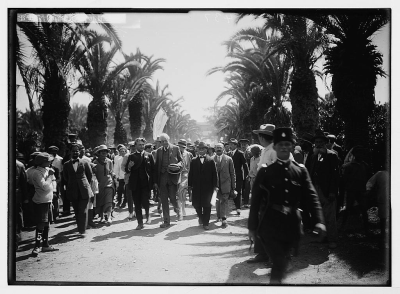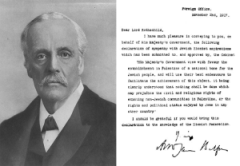When Gershon Agron Met Lord Balfour

By Alexander Zvielli, The Jerusalem Post
January 7, 2014
Few people remember today that Gershon Agronsky (Agron), the founder and first editor of The Jerusalem Post, interviewed Lord Balfour at a press conference held in Jerusalem on March 24, 1925.
(The Palestine Post was founded on December 1, 1932, and became The Jerusalem Post on April 13, 1950.) This was an unusual opportunity to convey to his lordship a number of important Yishuv messages. A rather difficult task – one doesn’t embarrass an important guest with complaints.
But while Lord Balfour was no longer the British prime minister, he was still highly respected and could exert much needed influence in the highest British quarters.
Palestinian High Commissioner Lord Samuel was about to retire and it was vital that he be replaced by a strong man, serious about the implementation of the 1917 Balfour Declaration, which was in a grave danger.
Arthur James, the first earl of Balfour and the father of the B.D., arrived in Jerusalem for the formal opening of the Hebrew University of Jerusalem, which was to be held on March 25, 1925. His arrival was a key historical event because many forces wished to set his Declaration aside, despite the Yishuv’s good progress.
The April 1920 Arab riots in Jaffa left a growing apprehension in Britain about the continued adherence to the B.D. More and more voices were heard saying that this obligation, assumed during the turmoil of World War I, was a mistake which ought to be corrected.
English taxpayers questioned the cost of Zionism, which some experts described as an unsound and uneconomic enterprise.
The so-called “anti-wasters,” led by Esmond Harmsworth, MP, claimed they had nothing against Zionism, except that Jews pay for it, and that the Arabs were “uncomfortable.”
Winston Churchill, who became secretary of state for the colonies in 1921, argued that if there were no British troops in Palestine, they would have to garrison the Suez Canal.
Chaim Weizmann, president of the World Zionist Organization, proved that Zionism didn’t cost British taxpayers at all, but the London press favored the “anti-wasters.”
The B.D. was also fiercely attacked by an All-Arab Congress meeting held in Geneva in July and August 1921, which demanded an all-Arab self-government for Palestine. The 1921 Haycraft Commission report on the Arab Jaffa riots of April 1920, condemned the brutality of the Arab rioters, denied that the Jewish immigrants were Communists, but questioned the British policy which, it claimed, had failed to consider the extent of the rising Arab resentment, inflated by the 1917-1921 British Military Administration.
Lord Northcliffe argued that too many Jewish settlers were Communists and questioned Zionism as a danger to the British Empire which ought to keep 50 million Muslims happy.
A motion for the repeal of the B.D. won a majority in the House of Lords. A distressed Weizmann complained to Lord Balfour, who advised him not to take this affront seriously, saying: “What does this matter, if a few foolish Lords passed such motion.”
A similar motion failed in the House of Commons. However Churchill’s White Paper separated Transjordan from Palestine in order to compensate Arabs. This had reduced the scope of the B.D. to one-third of the Palestine Mandatory territory.
In his address to the Mandates Commission in 1924, Lord Samuel said that the basic principle of his administration’s policy had been to deal with the Arabs as if there was no B.D. The problem was that he dealt with Jews in a similar manner, as if there was no obligation to facilitate the Jewish immigration and their close settlement on land.
It was, therefore, important that Lord Balfour visit Palestine and be shown that the past seven years had changed an abandoned backwater of the Turkish Empire into a Land of Promise. Chaim Weizmann wisely connected Balfour’s visit with the formal opening of the Hebrew University and laying the Foundation Stone for the Balfour-Einstein Institute of Mathematics and Physics. When invitations were sent out for its opening ceremony to be conducted by Lord Balfour on April 1, 1925, Arabs protested and sent a delegation to Europe, the Vatican and Britain seeking retraction of the B.D.
In March 1925, Weizmann, his wife and son, Lord Balfour, his secretary Edward Lascelles and his wife, Balfour’s niece, Joan Lascelles, boarded the MS Esperia in Naples to travel to Cairo. Balfour stayed in Cairo with Lord Allenby who, according to Weizmann’s memoirs, a few days later accompanied the whole party by train through Kantara to Jerusalem. Balfour and his party arrived by train at Lydda to be welcomed by a representative of Lord Samuel and by the government’s chief secretary, Sir Gilbert Clayton. In accordance with the wishes of the lord, no other delegations and no demonstrations were allowed and the party left by cars for Government House in Jerusalem. The official directive was that if any sections of the population wished to express welcome they could do this later.
It was a great privilege for the Yishuv to greet this great man whose declaration of November 2, 1917, issued on behalf of the British government, had paved the way to the restoration of the Jewish national home in Palestine. But even the opposition, led by the Arab Executive which ordered “a day of rest” as a sign of protest, was hardly universal.
Many Arabs noted the positive aspects of the Jewish immigration and initiative. One Arab journalist rightly remarked that a protest against Balfour’s visit was not the right way to a victory. The Arabs in Palestine, he said, will not realize their aims by protestations, delegations or disturbances. If the Arabs wished to compete with Jews, they should fight them with their own weapons: culture and progress. Another Arab journalist commented that the only purpose of the Higher Arab Executive in ordering the merchants’ strike against Balfour was to impress the poor fellahin, so that the Executive could control them better.
The Mandatory Government’s official attitude in the developing Arab-Jewish conflict was to remain a strictly neutral spectator between all contending forces. It took care to refrain from any act or statement which could serve as an indication as to where its sympathies lie. But most British officials resented the B.D. and felt affinity towards the native Arab population.
They were thus deeply disappointed when Balfour’s highly successful visit and the formal opening of the Hebrew University strengthened the Yishuv and made the B.D. even more relevant. The enthusiasm with which Lord Balfour was received throughout the country was indescribable.
He was most warmly received wherever he went. At the opening of the university Balfour said: “A new era has begun. The great cultural genius that came to an end, and that had been dormant for so many years, is now going to be renewed.”
A long list of diplomats and scientists who attended the ceremony described it in glowing terms. Two important participants: General Allenby and Prof. William Rappard, the permanent secretary of the Mandates Commission, the representative of the University of Geneva, who were previously skeptical, became converted to the Zionist cause.
The relevant details of Lord Balfour’s visit and the accompanying commentary, including an original Pathe film, are all available on the Internet today.
WHAT ONE cannot find on the Internet are the details of the press conference, held at the Lord Samuel’s office in Government House, attended by a few local and foreign journalists who arrived especially for the occasion. Greeting his guests, Lord Balfour warned that it wasn’t his intention to make a statement, for the reason that he had no statement to make. He came to Palestine as a private visitor and an observer only.
Gershon Agronsky was the first to ask Balfour what were the principal impressions of his visit.
Balfour said that the few hours that he spent in Palestine were hardly sufficient to express an expert opinion, but he was deeply moved by his enthusiastic, wonderful reception in Tel Aviv and Rishon Lezion.
Everything he had seen was most interesting and greatly satisfactory and had by far exceeded his expectations. He was most impressed by halutzim (pioneers) working at Dilb (Kiryat Anavim) on the slopes of barren hills, carrying out the difficult and arduous labor under burning sun with great energy and cheerfulness.
He was not an economic expert, but he felt that a great job was being carried there in the way of terracing and farming. The modern dairy farms would do honor to modern farming all over the world. Herds of cows were apparently better lodged than the halutzim themselves.
What did Lord Balfour think about the separation of Transjordan, a deliberate amputation of the scope of the B.D.?
Balfour said that this was already done a few years earlier and there was no point in bringing up the issue again. Anyhow, he had no authority to speak about political matters.
He quickly changed the subject and commented that he was not aware that the Arabs who visited him were a formal deputation, he thought it was a social visit.
To read the full article, click here.






Leave a Comment on Israel Forever